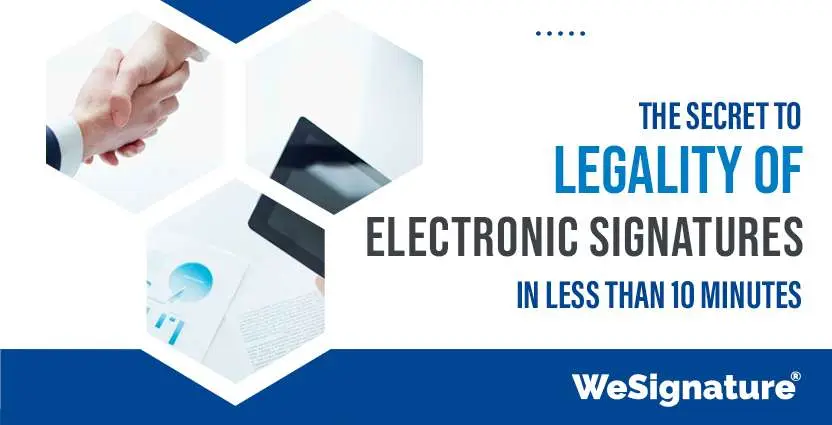The Secret to Legality of Electronic Signatures In Less Than 10 Minutes

Electronic signatures are a digital tool that represents a person’s consent to an official agreement. This is a technology that has been there for a long time now but it has gained prominence only in the past few years. The acceptance of electronic signatures software and its use in so many countries all over the world is increasing with each passing day. In this scenario, the legality of electronic signatures is a factor that many people seem to question. If you are also one of them then reading this blog will help you clear your doubts.
Firstly, let us begin by saying that electronic signatures are legal and are capable of creating a legally binding and enforceable document.
Today, an electronic signature service is widely recognized and accepted all over the world. This is a technology that is secure and user-friendly when compared with physical signatures which also makes it much less prone to fraud and forgery.
The technology makes the process of creating, signing, and sending sensitive documents a lot better.
In this blog, we will be talking about what makes online signatures legally binding while discussing the laws that make electronic signatures valid in the US.
How Can You Understand the Exact Process of Legality of Electronic Signature?
In the year 2000, the federal government of the United States passed an act called the Electronic Signatures in Global and National Commerce Act or the ESIGN Act.
This is a legally enforceable act that works in conjunction with the Uniform Electronic Transactions Act and confirms that electronic signatures include legally binding documents when all parties choose to sign digitally.
The e-signature software for small business include a complete range of technologies and solutions for creating an online signature. Starting from simple images of a signature attached to an electronic document to the drawing of signatures, there are many methods.
Sometimes you could be asked to click “Agree” on a website and at other times, you will be asked to sign with your fingerprint, while some other times you will be using an electronic signature service.
All of these methods are considered electronic signature solutions.
Now you have a little idea about the legality of electronic signatures.
Let’s move ahead.
Validity or Legality of Electronic Signatures in the US States
The electronic signatures are valid in all of the US States and are also allowed a similar legal status as physical signatures under some state laws.
In different developed countries of the world, online signatures carry the same repute and legal validity as compared with physical signatures.
Yes, the laws will definitely differ from each other but there is no question if online document signing is legal or not. It is completely legal.
You can effectively use an electronic signature for creating a legally enforceable document. In all the situations where authentication is needed in the US, the electronic signature tools can be maximized for creating, signing, and sending a document. This is something that is applicable to the regions of all the industrialized countries.
Legal Enforceability of Electronic Signatures in Present World
The combination of an electronic signature technology with an authentication, security and audit trail is potent. It’s more robust and legally valid compared to traditional pen-and-paper signatures.
Mostly, when it comes to the validity of the physical signatures, they are established by comparing different copies of signatures. You have to present testimony from writing experts present at the time of signing, highlighting the importance of relying on experienced ghostwriting services for accurate and credible documentation.
This is a process that is particularly expensive and a lot more time-intensive. In addition, it is also a lot less reliable because it comes with a manual element.
Audit trails automate data recording, ensuring authenticity by removing human error from the process. It is also easy to address disputes in the state and federal courts. The feature of audit trails is extremely valuable in the authentication of legality of electronic signatures.
While creating an electronic signature, the software automatically timestamps all changes for accountability.
The changes such as sending, viewing, printing, signing, and sending are all recorded.
The system stores signer information, actions, and documents, with added validation like a certificate of completion.
This certificate includes sender and signer identities, signature image, timestamp, IP address, and more.
Which Documents Can Be Signed Electronically?
The use of electronic documents and signatures are widely enforceable for businesses and even personal transactions in major industrialised countries.
There are many common business documents that can be signed electronically. Some of the documents that are being commonly signed electronically are mentioned below.
- HR-related documents such as hiring and relieving letters, employee policy documents, etc.
- Purchase orders and logistic related documents.
- Any non-disclosure documents including sales and marketing documents.
- Financial transaction documents
- Real Estate dealing documents.
- Healthcare documents.
- Student services.
There are some exceptions to this because the use of electronic signatures is sometimes not valid. Electronic signatures aren’t legally valid for wills, court orders, or hazardous material requirements, according to the National Telecommunications Information Administration.
It is recommended that the user reads about the jurisdiction laws referring to the benefit of using e-signatures in complete detail.
Summing Up:
A key challenge for modern businesses in electronic transactions is determining the necessary level of signatory authentication.
Many companies aim to create legal, court-admissible documents without complicating the process for those completing transactions.
To ensure an easy and authentic signing process, many companies use a trusted electronic signature service for business dealings.
When businesses choose to work with trusted technology, they can be certain that the contracts are legally valid and admissible.
The adoption of an electronic signature offers a seamless, effective and intuitive signing experience to everyone involved.
